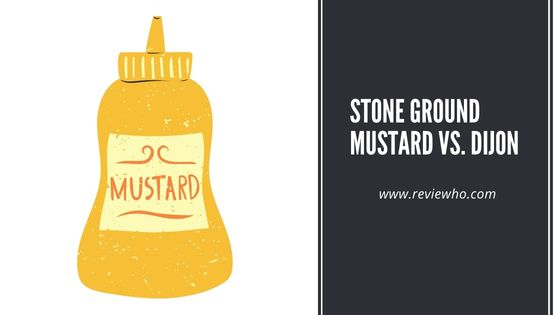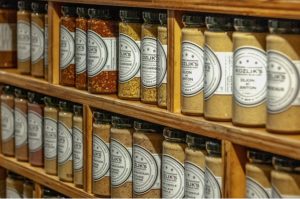There are many types of condiments on the planet and mustard is among the oldest and best there. Mustard is made by grinding mustard plant seeds and mixing them with a liquid. The varieties are created because of the different liquids and seeds used.
Is stone-ground mustard the same as Dijon? Dijon mustard and stone ground mustard are quite similar in different ways. They are both prepared and have a similar main ingredient. That being said, they are not the same thing and there are certain differences you should know about.
We have prepared this post to give a detailed stone ground mustard vs. Dijon comparison. Let’s take a deeper look.
How they differ
In regards to the time of invention, stone ground mustard is older while Dijon only came to be around the 13th century. However, Dijon mustard only became popular in the 19th century when it was used with verjuice.
Stone ground mustard is made using ground brown mustard. Is stone-ground mustard actually stone-ground? Well, the older version of this mustard was ground using two millstones which resulted in whole, partially ground, and fully ground seeds. You will notice that it features a coarse and thick texture. Dijon mustard, on the other hand, uses seeds that are completely ground. That allows it to have a creamy and smooth texture.
Mustard needs a liquid to provide some acidity. Normally, vinegar is the preferred option for stone ground mustard. In some instances, however, wine is preferred. Dijon mustard is made using vinegar coupled with wine to give that traditional flavor.
Dijon and stone ground mustards are made using the same type of seeds. Regardless, you will realize that stone ground mustard is milder compared to Dijon mustard. The reason for this difference is that Dijon mustard seeds are completely ground while stone-ground mustard seeds are not completely ground. After grinding, heat is released by the components. Since stone-ground mustard is more acidic, the heat is cut down.
Does stone ground mustard have horseradish in it?
Stone ground mustard is a type of mustard that is made with whole mustard seeds that are ground into a paste. The paste is then combined with vinegar, water, and spices. The result is thick, creamy mustard that has a strong, pungent flavor. So, does stone ground mustard have horseradish in it?
The answer is yes! Horseradish is one of the spices that is used to flavor stone-ground mustard. The horseradish gives the mustard its characteristic heat and spice.
Can you Substitute Coarse Ground Mustard for Dijon?
In most cases, stone-ground mustard can replace Dijon mustard. Stone ground mustard that has white wine will work better as a Dijon mustard substitute. Since it is thicker and coarse, it might work better than Dijon mustard. However, if what you need is a smooth texture in your dish, it might not be the best option.
Dijon mustard can also replace stone ground mustard. If heat is what you are after, the spicier Dijon might work better. Even so, the smooth texture does not always agree with everyone. It might not feel good to the mouth.
FAQs:
Is stone-ground mustard good for you?
The answer is yes. Mustard is a tasty addition to sandwiches and dishes, but it’s also good for you.
Mustard seeds are an excellent source of iron, a mineral that your body needs to make red blood cells. Red blood cells carry oxygen from your lungs to all parts of your body, which means that iron plays a vital role in energy production.
Mustard seeds also contain thiamin (vitamin B1), niacin (vitamin B3) and vitamin E. These vitamins help maintain good health by supporting healthy skin, nervous system function, digestion, and more.
The phytochemicals in mustard seeds may help lower cholesterol levels and prevent heart disease, although more research is needed to confirm these benefits.
Final Words
The stone ground mustard will work perfectly when in sandwiches because it complements the ham or beef. It also works great with barbecue sauces and wet rubs. Dijon mustard, on the other hand, works perfectly in sauces and glazes. If you want a mustard flavor without the seeds being seen, then you might need Dijon mustard.
Related articles that you may like:
- Spicy Brown Mustard vs Dijon
- Difference Between Rose Water And Rose Essence
- Difference Between Crab Louie Dressing and Thousand Island
Feel free to share your observations with me in the comments section!
Also, if you find the information in this post to be useful, be sure to share this post with your friends on Facebook, Twitter, and Pinterest!





